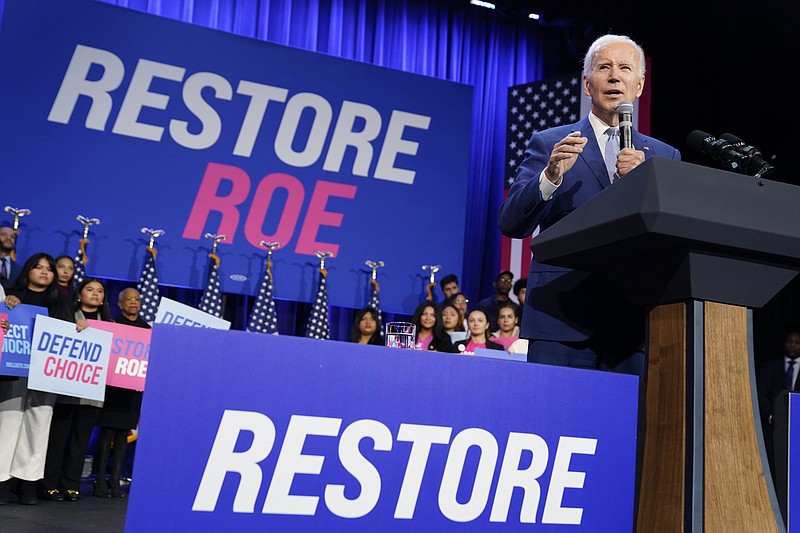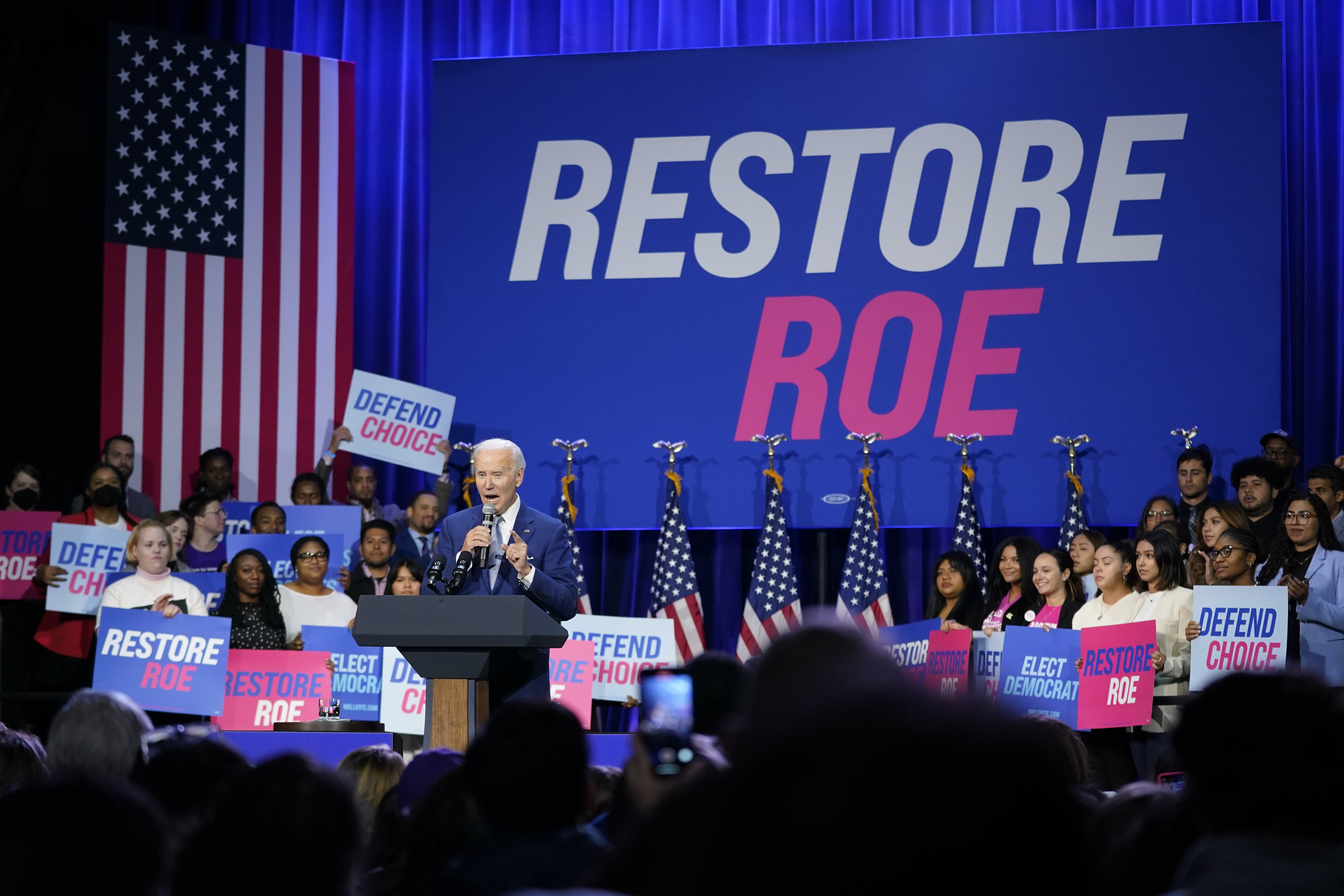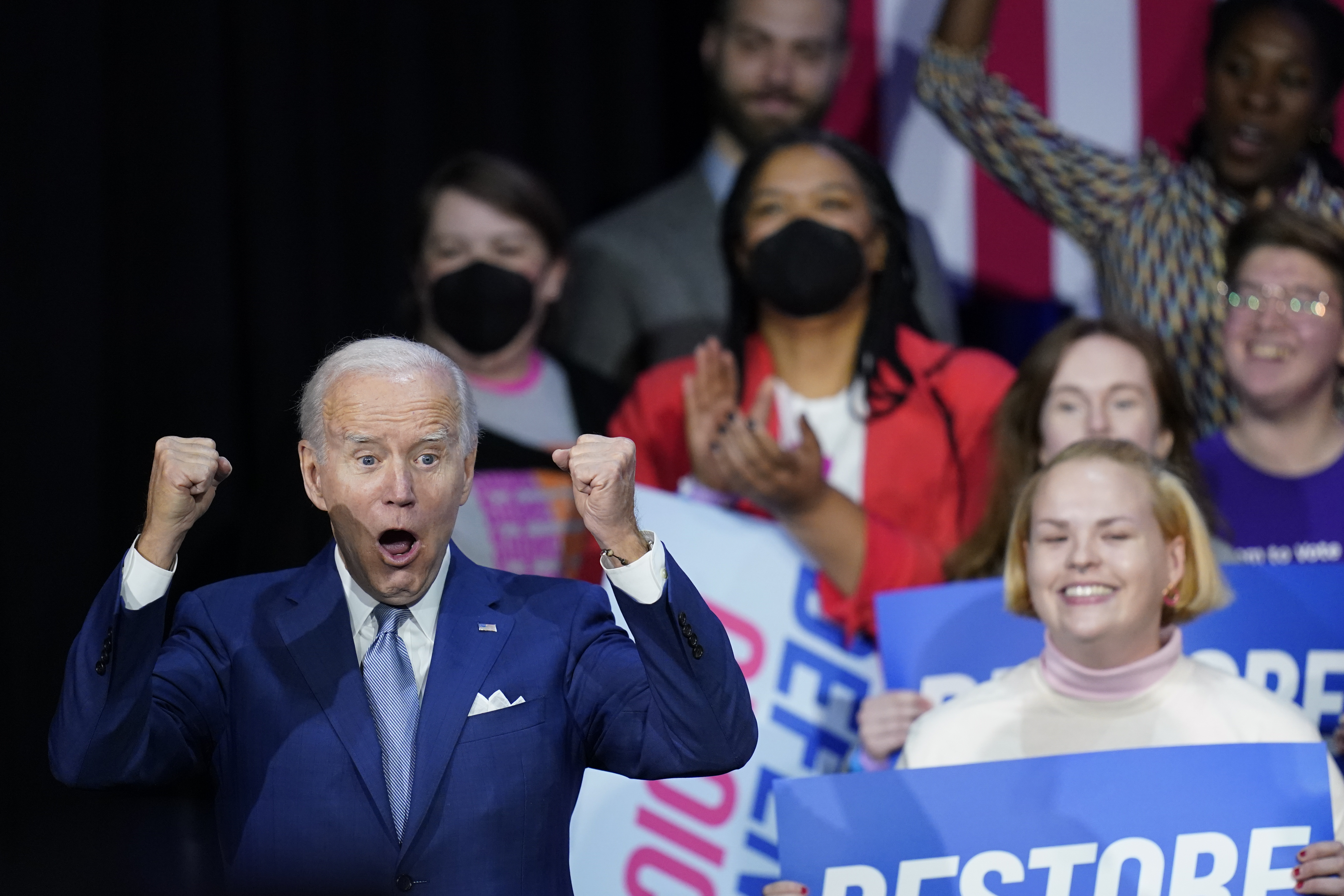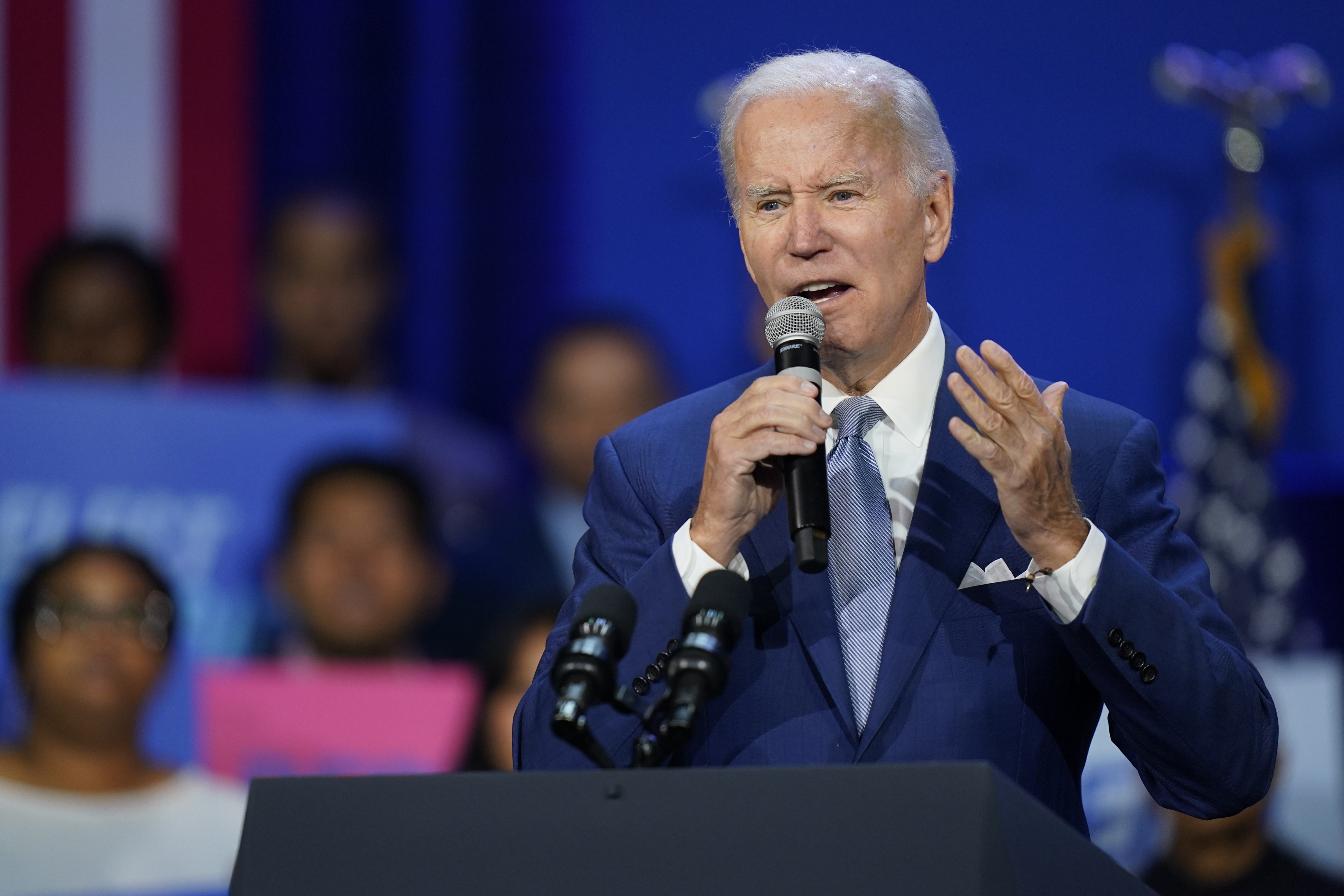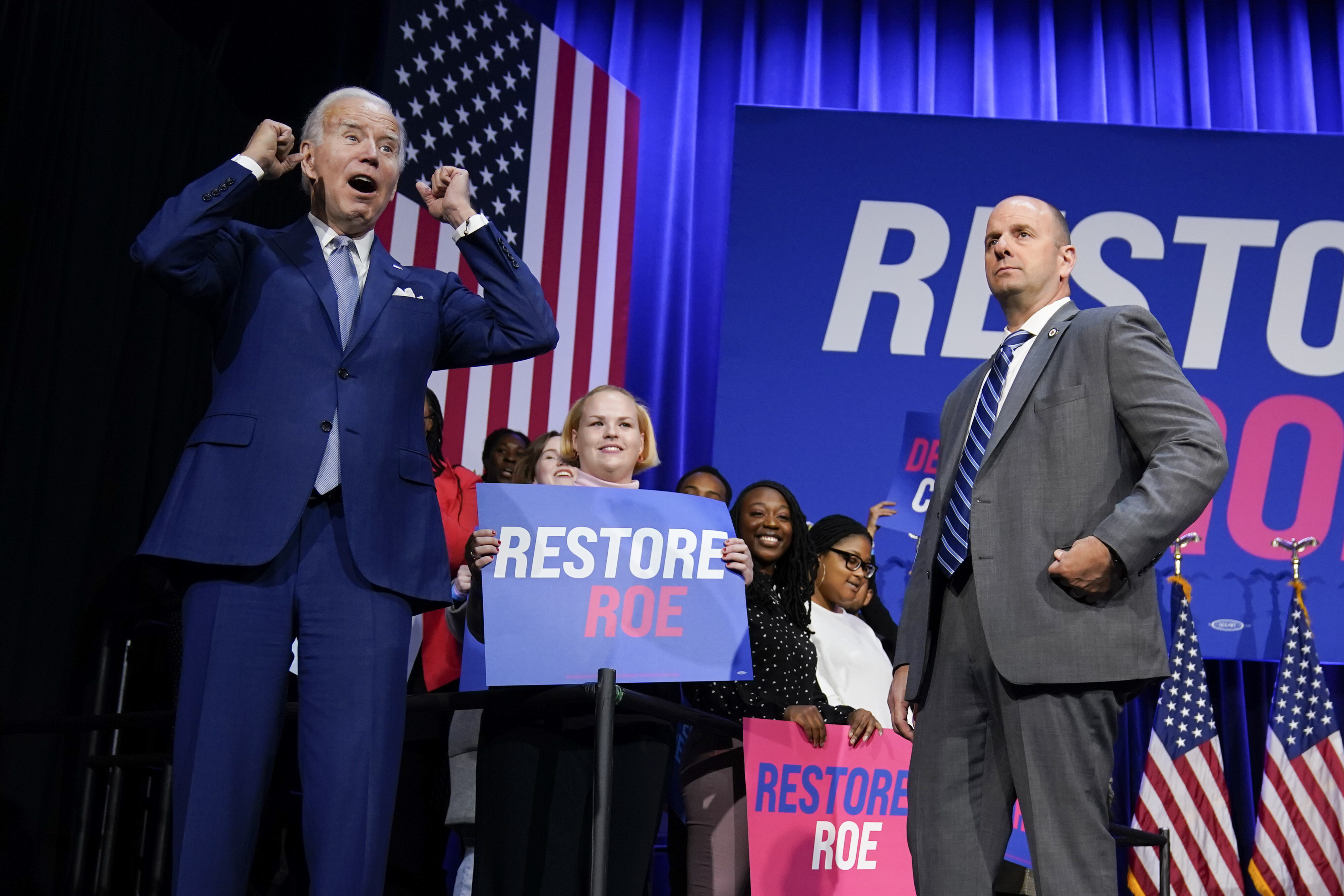WASHINGTON -- President Joe Biden promised Tuesday that the first bill he sends to Capitol Hill next year will be legislation to enshrine abortion rights into law -- if Democrats control enough seats in Congress to pass it -- as he sought to energize his party's voters just three weeks ahead of the November midterms.
Twice over, Biden urged people to remember how they felt in late June when the Supreme Court overturned the Roe v. Wade ruling that legalized abortion, fresh evidence of White House efforts to ensure the issue stays front of mind for Democratic voters this year.
"I want to remind us all how we felt when 50 years of constitutional precedent was overturned -- the anger, the worry, the disbelief," Biden said in remarks at the Howard Theatre in Washington.
He repeatedly lambasted Republicans nationwide who have pushed for restrictions on the procedure, often without exceptions, and told Democrats in attendance that "if you care about the right to choose, then you gotta vote."
As he has done all year, Biden emphasized that only Congress can fully restore abortion access to what it was before the Supreme Court's decision in Dobbs v. Jackson, which overturned Roe. But he also acknowledged "we're short a handful of votes" now to reinstate abortion protections at the federal level, urging voters to send more Democrats to Congress.
"If we do that, here's the promise I make to you and the American people: The first bill that I will send to the Congress will be to codify Roe v. Wade," Biden said. "When Congress passes it, I'll sign it in January, 50 years after Roe was first decided the law of the land."
Democrats would need to retain House control and expand their Senate majority to make good on Biden's promise to codify abortion rights into law. But that could be a challenge -- polls show the Republican Party is favored to win control of the House and could also take back the Senate.
The president's focus on abortion reflects the anxiety among Democrats that the issue of abortion is losing resonance with voters. A New York Times/Siena poll released this week found that the economy was a far more important issue to voters and women who identified as independent voters were swinging sharply in favor of Republicans.
Asked whether abortion was now the president's top legislative priority, before the economy, Karine Jean-Pierre, the White House press secretary, demurred.
"He is going to continue to talk about issues that are impacting the American people," Jean-Pierre said.
Abolishing the filibuster -- the legislative rule that requires 60 votes for most bills to advance in the Senate -- amid opposition in their own ranks will also pose a significant challenge for Democrats.
Long resistant to any revisions to Senate institutional rules, Biden said in the days after the June decision to overrule Roe that he would support eliminating the supermajority threshold for abortion bills, just as he did on voting rights legislation.
But two moderate Democrats -- Sens. Kyrsten Sinema, Ariz., and Joe Manchin, W.Va. -- support keeping the filibuster. Sinema has said she wants to retain the filibuster precisely so any abortion restrictions backed by Republicans would face a much higher hurdle to pass in the Senate.
The Democratic-led House in July passed legislation that would protect abortion access nationwide, going beyond simply codifying Roe, but the measure had stalled in the Senate in May, falling short of the 60 votes needed to advance. That measure would explicitly prohibit a long list of abortion restrictions, including some that have been enacted by states since Roe was decided in 1973 and that have severely limited access to the procedure.
On Tuesday, surrounded by activists holding signs that read "Defend Choice" and "Restore Roe," Biden cast the midterms as a choice between Republicans who have called for a national abortion ban and Democrats who want to protect reproductive freedom.
"If Republicans get their way with a national ban, it won't matter where you live in America," the president said.
He pointed to legislation introduced recently by Sen. Lindsey Graham, R-S.C., that would institute a federal ban on abortions after 15 weeks of pregnancy. Biden insisted that such policies would never be enacted under his watch.
"If such a bill were to pass in the next several years, I'll veto it," the president said. "But we can't let it pass in the first instance."
Biden unveiled measures this month to try to protect abortion access.
He directed the Education Department to remind universities that they cannot discriminate against students on the basis of pregnancy, including if a pregnancy has been terminated. The Department of Health and Human Services also announced $6 million in grants to expand access to family planning clinics that receive Title X federal funding.
In his speech Tuesday, Biden promised to write abortion protections into law. But the White House had no additional details to share about what the legislation would look like beyond explaining that it would restore the rights that were protected under Roe.
ENDING FILIBUSTER
Democratic Senate candidates in Pennsylvania and Wisconsin have said they support eliminating the filibuster in order to pass abortion legislation. Pennsylvania Senate candidate John Fetterman has actively campaigned on being the 51st vote for priorities such as legalizing abortion, codifying same-sex marriage protections and making it easier for workers to unionize -- all measures that would otherwise be blocked by a filibuster in the Senate.
Abortion -- and proposals from some Republicans to impose nationwide restrictions on the procedure -- have been a regular fixture of Biden's political rhetoric this election cycle, as Democrats seek to energize voters in a difficult midterm season for the party in power in Washington.
In fundraisers and in political speeches, Biden has vowed to reject any abortion restrictions that may come to his desk in a GOP-controlled Congress. Like he did Tuesday, Biden has also urged voters to boost the Democratic ranks in the Senate so enough senators would not only support reinstating abortion nationwide, but would change Senate rules to do it.
Reproductive rights groups such as the Planned Parenthood Action Fund, Emily's List and NARAL Pro-Choice America have spent $150 million to mobilize voters around the country in the runup to the elections.
"We must send Democratic pro-choice candidates to Congress who will work alongside the Biden administration to protect reproductive freedom and essential health care for tens of millions across the country," Laphonza Butler, president of Emily's List, said in a statement.
Opponents of abortion rights have also sought to capitalize on the issue.
Marjorie Dannenfelser, president of Susan B. Anthony Pro-Life America, said Tuesday the stakes of next month's midterm elections "could not be higher."
"Doubling down on an extreme agenda of abortion on demand until birth won't stop Democrats from losing Congress, even with the abortion industry spending record sums to elect them," Dannenfelser said. "Biden's party is on the wrong side and stunningly out of touch.
On Tuesday, Biden made a pointed appeal to young voters, who traditionally participate in lower rates than other age demographics in midterm elections. Though his remarks were primarily focused on abortion, Biden also mentioned his decisions to forgive billions of dollars in student loan debt and to issue pardons for marijuana possession -- moves popular with younger voters.
"What I am saying is, you represent the best of us. Your generation will not be ignored, will not be shunned and will not be silent," Biden said, adding: "In 2020, you voted to deliver the change you wanted to see in the world. In 2022, you need to exercise your power to vote again for the future of our nation and the future of your generation."
Court decisions and state legislation have shifted -- and sometimes, reshifted -- the status of abortion laws across the country. Most abortions are now banned in at least 14 states, and other states are engaged in legal fights over access.
Biden administration officials estimate that nearly 30 million women of reproductive age live in a state with a ban and that about 22 million women cannot access abortion care after six weeks.
Meanwhile, codifying Roe remains a broadly popular position. In a July AP-NORC poll, 60% of U.S. adults said they believe Congress should pass a law guaranteeing access to legal abortion nationwide.
Even with the economy dominating so much of the midterm discourse, abortion has been a touchstone in high-profile contests from Ohio to Arizona, especially as Democrats try to trap Republicans between their most ardent anti-abortion base voters who want absolute or near-total bans and a majority of U.S. adults that wants at least some legal access to elective abortions.
For instance, in Georgia, Republican Senate nominee Herschel Walker went so far in his only debate against Sen. Raphael Warnock, a Democrat, as to deny his previous support for a national abortion ban with no exceptions.
Despite Walker's previous statements captured on video, he insisted Warnock misrepresented his position.
Walker said in the debate he backs a Georgia statute outlawing abortion after six weeks of pregnancy -- an effective ban for some women because it's so early they don't yet know they're pregnant. The law includes exceptions for later abortions in cases of rape, incest and involving health risks to a woman.
Warnock, meanwhile, avoided direct questions about whether he'd support any abortion limits, instead turning the question to Walker's position.
Information for this article was contributed by Seung Min Kim, Aamer Madhani, Geoff Mulvihill and Bill Barrow of The Associated Press and by Alan Rappeport of The New York Times.
